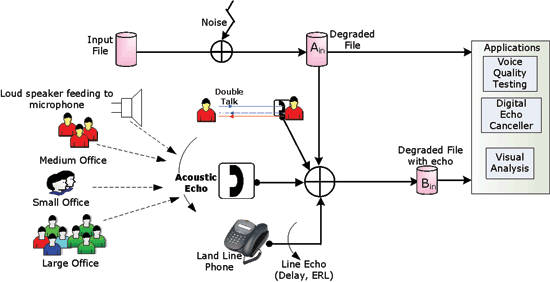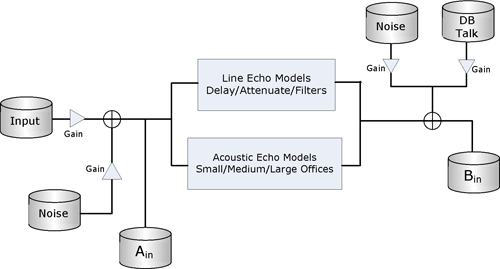Newsletter: GL Releases Audio Processing Utility (APU) Software
Welcome to the July issue of GL Communications' Newsletter providing information and insight into our latest product Audio Processing Utility or (APU) a tool to generate controlled voiceband impairments with known speech levels, line or acoustic echo, noise, attenuation, and delay characteristics. The tool is quite useful in the evaluation of:
- Line Echo Cancellers (LEC) and Acoustic Echo Cancellers (AEC)
- Noise Cancellers and Automatic Gain Control Functions
- Voice Enhancement Devices
- Signal Processing Devices in TDM, VoIP, and Mobile Networks
Overview
The Audio Processing Utility is a pre-processing application used for manipulating input audio (tones, and voice) files with impairments such as delay, noise, acoustic echo, line echo, and double talk. A line or acoustic echo filter may be specified to generate an echo file in addition to the degraded file. It analyzes the given filter coefficient files and calculates the applied delay & echo return loss (ERL) parameters. The degraded audio output file can then be visually analyzed or used further to test P.56 active speech level algorithms, Voice Quality Testing, Digital Echo Cancellers & other applications.

Typical Applications
- P.56 active speech level algorithm testing:
For a well-defined input file, APU will generate a precisely controlled degraded file. This degraded file can be used to test P.56 active speech level algorithm applications.
- VQT (Voice Quality Testing):
The input voice file and the controlled degraded file can be fed into a VQT algorithm to test VQT applications.
- EC (Echo Canceller) testing:
The input (reference file) file and the echo file can be used to test the ECs. APU can generate line echo and acoustic echo files, and test line ECs and acoustic ECs, which makes it unique.
Main features
- Add Noise: Generates degraded voice files with noise, power level, & interference
- Add Echo: Generate echo files with appropriate acoustic & hybrid echo
- Add Double Talk: Generates an output file that contains speech file from both near end and far end
- Analyzes filter coefficients, ERL (Echo Return Loss), and delay from the generated files
- Supports line echo filter model of ITU-T G.168 specification and three proprietary acoustic echo filter models
- Supports A-law, µ-Law, Windows PCM (*.wav), and 16-bit Intel linear PCM audio file
- Supported Codecs are G.711 µ-law, G.711 A-law, G.723.1, G.726, G.729, G.729a, G.729b, G.729ab, G.729e, G.729g, iLBC (20ms and 30ms frame)
- Files generated can be used to test VQT, ECs, & P.56 active speech level
- Graphical representation of output file
To know more features of the product, visit Audio Processing Utility.
Modes of Operation
The APU can be used to generate the degraded files, with only noise (Ain), or with additional echo path filters and double talk parameters (Bin).

In analysis mode, the APU analyzes the available degraded files, and calculates the echo path filter coefficients, ERL & delay. The delay is defined as the maximum filter coefficient position and the ERL algorithm is calculated as follows:

For further information on the modes of operation, visit Audio Processing Utility.
 Back to Latest News Page
Back to Latest News Page